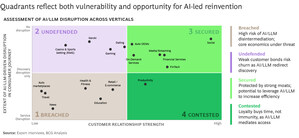
MONTREAL, Dec. 1, 2020 /PRNewswire/ -- In a major validation of their commitment to responsible technology, Mila, BCG GAMMA, Haverford College, and Comet.ml today released CodeCarbon, an open source software package to estimate the location-dependent CO2 footprint of computing. AI can benefit society in many ways but the amount of energy needed to support the massive computing behind it can come at a high cost to the environment.
Jointly developed by Mila, a world leader in AI research based in Montreal; GAMMA, BCG's global data science and AI team; Haverford College in Pennsylvania; and Comet.ml, a leading MLOps solution provider, CodeCarbon is a lightweight software package that seamlessly integrates into Python codebase. It estimates the amount of carbon dioxide (CO2) produced by the computing resources used to execute the code to incentivize developers to optimize their code efficiency. It also advises developers on how they can reduce emissions by selecting their cloud infrastructure in regions that use lower carbon energy sources.
Yoshua Bengio, Mila founder and Turing Prize recipient, said of the software, "AI is a powerful technology and a force for good, but it's important to be conscious of its growing environmental impact. The CodeCarbon project aims to do just that, and I hope that it will inspire the AI community to calculate, disclose, and reduce its carbon footprint." Sylvain Duranton, a managing director and senior partner at Boston Consulting Group (BCG) and global head of BCG GAMMA, said, "If recent history is any indicator, the use of computing in general, and AI computing in particular, will continue to expand exponentially around the world. As this happens, CodeCarbon can help organizations make sure their collective carbon footprint increases as little as possible."
Why Organizations Need This Tool Now
Training a powerful machine-learning algorithm can require running multiple computing machines for days or weeks. The fine-tuning required to improve an algorithm by searching through different parameters can be especially intensive. For recent state-of-the-art architectures like VGG, BERT, and GPT-3, which have millions of parameters and are trained on multiple GPUs (graphic processing units) for several weeks, this can mean a difference of hundreds of kilograms of CO₂eq.
Helping Organizations Live Up to Their Carbon Promises
The tracker records the amount of power being used by the underlying infrastructure from major cloud providers and privately hosted on-premise datacenters. Based on publicly available data sources, it estimates the amount of CO2 emissions produced by referring to the carbon intensity from the energy mix of the electric grid to which the hardware is connected. The tracker logs the estimated CO₂ equivalent produced by each experiment and stores the emissions across projects and at an organizational level. This gives developers greater visibility into the amount of emissions generated from training their models and makes the amount of emissions tangible in a user-friendly dashboard by showing equivalents in easily understood numbers like automobile miles driven, hours of TV watched, and daily energy consumed by an average US household.
Open Source and Community-Based
The ability to track CO2 emissions represents a significant step forward in developers' ability to use energy resources wisely and, therefore, reduce the impact of their work on an increasingly fragile environment. The developers expect that CodeCarbon will also help introduce greater transparency into the developer community, enabling developers to measure and then report emissions created by an array of computing experiments. Jonathan Wilson, Associate Professor of Environmental Studies at Haverford College, said, "Computing's carbon footprint depends on where the computations are performed, how much power is consumed, and whether fossil fuels or low-carbon sources generate that electricity. CodeCarbon will show you where to run your code to minimize your carbon footprint." Niko Laskaris, data scientist, Comet.ml, said, "Our community needs to innovate more responsibly, and that starts with tracking and optimizing your model. With CodeCarbon, data scientists and teams can keep building great models, but with a new parameter: the carbon footprint of their work."
The team creating this open source tool has also said they look forward to developers and researchers using it and contributing to it by enhancing it with new capabilities. To increase awareness of the environmental impact of computing, they strongly recommend that users report the CO2eq of their experiments in research papers, articles, and tech blogs.
The climate damage caused by greenhouse gas emissions is evident. The developers of CodeCarbon hope that a tool that measures the environmental impact of artificial intelligence computing will be one way to help reduce its carbon footprint.
More information about CodeCarbon can be found here.
To arrange an interview with one of the authors, please contact Eric Gregoire at +1 617 850 3783 or [email protected].
About BCG GAMMA
BCG GAMMA is BCG's global team dedicated to applying artificial intelligence and advanced analytics to critical business problems at leading companies and organizations. The team includes over 900 data scientists and engineers who utilize AI and advanced analytics (machine learning, deep learning, optimization, simulation, natural language and image analytics, etc.) to build solutions that transform business performance. BCG GAMMA's approach builds value and competitive advantage at the intersection of data science, technology, people, business processes, and ways of working. For more information, please visit our webpage.
About MILA
Founded by Professor Yoshua Bengio of the Université de Montréal, Mila is a research institute in artificial intelligence which rallies over 700 researchers specializing in the field of deep learning. Based in Montreal, Mila's mission is to be a global pole for scientific advances that inspires innovation and the development of AI for the benefit of all. Mila is a non-profit organization recognized globally for its significant contributions to the field of deep learning, particularly in the areas of language modeling, machine translation, object recognition, and generative models. For more information, visit Mila.quebec.
About Haverford College
Haverford College, founded in 1833, is a leading liberal arts undergraduate college located outside Philadelphia that is known for its academic rigor, Honor Code, and beautiful arboretum campus. For more information, visit haverford.edu.
About Comet.ml
Comet is a leading provider of self-hosted and cloud-based MLOps solutions. Comet Enterprise, the company's flagship product, enables data scientists and teams to track, compare, explain, and optimize experiments and models. Backed by thousands of users and multiple Fortune 100 companies, Comet provides insights and data to build better, more accurate AI models while improving productivity, collaboration, and visibility across teams. Learn more at www.comet.ml.
SOURCE Boston Consulting Group (BCG)







Share this article